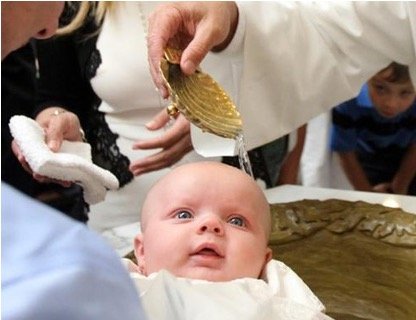
Gospel according to Saint John 6,41-51:
The Jews murmured about Jesus because he said, “I am the bread that came down from heaven,” and they said, “Is this not Jesus, the son of Joseph? Do we not know his father and mother? Then how can he say, ‘I have come down from heaven’?” Jesus answered and said to them, “Stop murmuring among yourselves. No one can come to me unless the Father who sent me draw him, and I will raise him on the last day. It is written in the prophets: They shall all be taught by God. Everyone who listens to my Father and learns from him comes to me.
Not that anyone has seen the Father except the one who is from God; he has seen the Father. Amen, amen, I say to you, whoever believes has eternal life. I am the bread of life. Your ancestors ate the manna in the desert, but they died; this is the bread that comes down from heaven so that one may eat it and not die. I am the living bread that came down from heaven; whoever eats this bread will live forever; and the bread that I will give is my flesh for the life of the world.”
Which is your Mount Horeb?
Luis CASASUS President of the Idente Missionaries
Rome, August 11, 2024 | XIX Sunday in Ordinary Time
1Kgs 19:4-8; Eph 4:30—5:2; Jn 6:41-51
It is clear that today’s Gospel focuses on how the Jews murmured about Jesus. Before speaking of the intentions or lack of understanding of their countrymen, it is worth noting that what they clearly perceived was a change in the life of Christ. For them, first he was the son of Mary and Joseph, a boy from an ordinary family. Now they saw in Him something that… they could not explain.
When we reflect on the evolution of the spiritual path, given our condition as sinners, the first thing that comes to mind is conversion: from our life of sin to the living of virtue, with the grace of God. But this is not the only possible change. In the life of Christ there is a striking transformation that makes evident the presence of God the Father in his way of thinking, speaking and acting.
This is a universal sign, which is given when there is a profound change in people… or in things. The intervention of a Father, of a force, of an apostle, of the Holy Spirit is clear… I will give them one heart and I will put a new spirit within them. And I will take the heart of stone out of their flesh and give them a heart of flesh, that they may walk in My statutes, and keep My ordinances, and do them (Ezek 11: 19).
In the 17th century, Isaac Newton, genius of Physics, wrote the three famous laws of motion, which are the basis of Classical Mechanics. The first one reads as follows: Every object continues in its state of rest or uniform and rectilinear motion unless its state is changed by some force acting upon it. In this apparently simple formulation, a way to detect the existence of a force is established.
Similarly, the changes that the Jews observed in the life of Jesus had no other explanation than the intervention of Providence. It is not surprising that we are deeply curious about the childhood and adolescence of Jesus, in order to try to understand what he was doing in his early youth and how God the Father brought him to the fullness of his redemptive mission. Pope Benedict XVI’s The Childhood of Jesus takes up this question.
In an endearing work of fiction, The Untold Adolescence of Jesus (1997), José María Sánchez Silva tries to imagine how the young Jesus was led to perform actions that were ever more clearly and visibly in the name of his Father.
In his book Transfigurations, our Founder, Fernando Rielo writes: The existence of God has only one proof: yourself. Accustomed to our individualistic culture, we may think that this is limited to our personal certainty about the presence or action of God, but it is also about the effect produced in my neighbor by certain changes in my poor life, which reveal the action of the Divine Persons.
Like the Jews, although people may murmur (which does not mean only to have reservations, but to criticize someone behind his back) at the changes of one who claims to follow Christ, divine intervention leaves its mark on the soul of the one it touches and of those who know him.
—ooOoo—
The story of the prophet Elijah is particularly relevant to understand God’s way of acting in us. It is precisely when he wishes to die that Yahweh calls for his help. In fact, we read in the First Reading how, when he says: Enough, Lord, take away my life, for I am not worth more than my fathers! The paradoxical divine response is to give him the necessary nourishment to fulfill a colossal, titanic mission: to confront King Ahab and his powerful wife Jezebel, who had brought to Israel corruption, pagan cults, social injustice and crimes caused by the hunger for power.
First of all, we must recognize that our situation is similar to that of Elijah, beyond the obvious differences of times and our personal role. Of course, we are not called, as he was, to eliminate 400 prophets of Baal, nor to be torn from the earth in a chariot of fire.
But each of us, like Elijah, has experienced some special difficulty, difficult to forget:
a very long time of contrariety because of mistreatment by someone, perhaps an authority or someone older;
a severe doubt about vocation, considering other alternatives for the rest of my life;
a difficult environment in the family or in the community, not feeling listened to, but rather, at times, a victim of envy;
a person who was a model for me, a positive example, and suddenly there appear regrettable acts or intentions in his/her life. The person falls from the pedestal where I had her;
a form of loneliness, physical or produced at the time of undertaking a mission that I expected to carry out with someone I trusted: educating children, caring for those who seek God, an unexpected or emergency job…
The Gospel and the Old Testament are important for many reasons, but today we must look at how God the Father acts in the most critical moments of our existence: as he did with Elijah, He does not free him from tiredness, but gives him food and forces him to walk in the desert for 40 days and 40 nights. The message is this:
I know that you are distressed and tired, but you have to walk even more. I give you now the strength to undertake a new mission, and I assure you that I will make fruitful that effort which now seems excessive and of little value to you. That is the proof of my trust; without any paternalism, as I did not have with my beloved Son.
St. Paul tells us in the Second Reading that God has marked us, as it was done to slaves, so that they could not escape. Certainly, the original mark is Baptism, but we continually receive this mark, a true seal impossible to erase, which is a spiritual stigma, not a physical one. As it happened to Elijah, we can refuse this mission, we can escape from this loving “slavery” of children…but that means a real death. That is the sad reaction of many, of most of the called ones, who are not willing to suffer, unless they can touch the reward, the fruits, right now. That was not the response of Elijah, of Moses (who had already ascended four centuries earlier to the same Mount Horeb), nor of Mary and Joseph, who saw their fame collapse in front of family and acquaintances.
God knows our suffering to the core, which is impossible for our neighbor, no matter how much he loves us.
Once, a young man from a very remote province went to the capital of the country to look for work. One day he posted a photo on Facebook. He was leaning against a very expensive car, a Lamborghini. His mother saw the photo replied to him saying: Oh, son, I’m glad you finally got a job and that you have such an expensive car. But the son sent her a message replying to his mother: Mom, I have to lean on the car or I will faint, because I haven’t eaten for days.
As the poet Henry W. Longfellow says: Every person has secret sorrows, which the world knows not. Oftentimes we call someone cold, when actually he’s lonely. This is often true. Sometimes we easily judge people, thinking: He’s fine, but he’s really not. Or This person is unpleasant, but in truth what is happening to him is that he is sad.
God knew how to deal with Elijah’s deep depression and fear. And one proof is that he managed to get the prophet to sleep, which is not easy for someone so distressed and depressed. The care that Providence has for us, the nourishment it gives us, is not only the Treasures of Baptism and the Eucharist. If Christ proclaims that he is the bread of life, he is referring not only to his presence in the Blessed Sacrament, but to the gifts he sends us, through the Holy Spirit:
* To give us the wisdom to have a different view of difficulties. It is often said that “every moment of crisis is an opportunity”. That sounds optimistic, but it is not always true. Christ, and only He, illuminates the meaning and purpose of every tear.
* To give us – like Elijah – the bread and water that allow us to walk, secure and strengthened because we do it with Him.
* That the signs of union mentioned in the Second Reading may be fulfilled in you and in me: Be kind, understanding, forgiving one another as God forgave you in Christ. Be imitators of God, as beloved children, and live in love as Christ loved you and gave himself for us to God as an oblation and a sweet-smelling victim. In this way it becomes possible to become more like our Father, whose first characteristic is mercy (Ex 34: 6).
Christ can accompany us in our pain and we can welcome his help, because we know that He has suffered too. Sometimes we do not pay attention to those who try to encourage us because deep down we do not believe that they understand exactly what is happening to us. Not so with Jesus. When the Gospel tells us that the Word became flesh (Jn 1: 14), it does not refer to the obvious fact that the Son of God assumed the external appearance of a man, but that he became like us, accepting even the most precarious of our condition, for the Semitic concept of “flesh” is not the strength of the muscles, but the weakest, most fragile part of the person: The spirit is willing, but the flesh is weak (Mt 26: 41).
The arduous ascent of Mount Horeb means recognizing one’s own weakness and finding consolation and sure confirmation in the person of Christ, no matter how much we may be helped at certain times by people of good will. I am the bread of life (…) this is the bread which comes down from heaven, that whoever eats it may not die.
_______________________________
In the Sacred Hearts of Jesus, Mary and Joseph,
Luis CASASUS
President

































 EN VIVO | ᴘʀᴏꜰᴇꜱɪóɴ ᴀᴘᴏꜱᴛóʟɪᴄᴀ ʏ ᴄᴏɴꜱᴀɢʀᴀᴄɪóɴ ᴄᴇʟɪʙɪᴀʟ de 𝗞𝗮𝗿𝗹𝗮 𝗝𝗮𝗶𝗹𝗲𝗻𝗲 𝗘𝘀𝗽𝗮𝗿𝘇𝗮 𝗖𝗵𝗮𝗺𝗯𝗮 y 𝗟𝘂𝗶𝘀 𝗗𝗮𝗻𝗶𝗲𝗹 𝗣𝗶𝗻𝘁𝗮 𝗣𝗮𝘂𝘁𝗲.
EN VIVO | ᴘʀᴏꜰᴇꜱɪóɴ ᴀᴘᴏꜱᴛóʟɪᴄᴀ ʏ ᴄᴏɴꜱᴀɢʀᴀᴄɪóɴ ᴄᴇʟɪʙɪᴀʟ de 𝗞𝗮𝗿𝗹𝗮 𝗝𝗮𝗶𝗹𝗲𝗻𝗲 𝗘𝘀𝗽𝗮𝗿𝘇𝗮 𝗖𝗵𝗮𝗺𝗯𝗮 y 𝗟𝘂𝗶𝘀 𝗗𝗮𝗻𝗶𝗲𝗹 𝗣𝗶𝗻𝘁𝗮 𝗣𝗮𝘂𝘁𝗲.  ¡Acompáñanos en este solemne acto de fe!
¡Acompáñanos en este solemne acto de fe! 